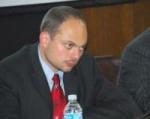
Washington Post Global Opinions
Last week, Russia’s justice ministry changed the name of one of the five dozen registered political parties. Most of them are empty shells created by Kremlin proxies to provide a false appearance of pluralism and are hardly worthy of a mention — but this particular case stood out.
The officials changed the name of the virtually unknown Free Citizens Party to the name Russia of the Future. The problem is that there already is a party called Russia of the Future, and it is led by Russia’s most prominent anti-corruption activist, Alexei Navalny. His supporters established it this year to participate in regional and municipal elections and applied to the justice ministry for registration.
After making the change, the ministry duly rejected the application submitted by Navalny’s supporters. This is the ninth time Navalny’s party has been denied ballot access. His previous attempts (with the People’s Alliance and the Progress Party) were rejected using the same method — just one of many Machiavellian tricks used by the Kremlin to keep its opponents off the ballot. “So great is the popularity of [Vladimir Putin’s] United Russia party; and so small, so marginal, and so unpopular are we that these puffed-up men from the Kremlin are afraid to see us on the ballot, even with all the fraud, administrative resources, and control of television,” Navalny wrote when this latest decision became public.
He has a point. It is remarkable how many Western analysts, journalists and politicians — whether they like Vladimir Putin or not — continue to parrot the Kremlin line about his supposed “popularity” among Russian citizens. The proof, they say, comes in impressive election results and sky-high opinion poll numbers.
What they seem to forget is how little meaning opinion polls have in an unfree society, where most people lack access to objective news coverage and — more importantly — where the response to a polling question is inevitably weighed against the potential risk of confiding in an unknown person about one’s attitude toward the regime. A recent survey by the Levada Center showed that 26 percent of Russians are afraid to tell pollsters their honest opinion — and they’re the only ones brave enough to admit that they are afraid. Last week’s comical debacle, when the leading state pollster “updated” Putin’s popularity from 32 percent to 72 percent after the Kremlin voiced its displeasure, proves the point. As Boris Vishnevsky, an opposition lawmaker from St. Petersburg, likes to remind people, Romanian dictator Nicolae Ceausescu enjoyed 99 percent support in the polls one week before his overthrow. Not that it helped him much.
Election results in Putin’s Russia are hardly more reliable than poll numbers. According to two leading international organizations in the field of election monitoring — the Council of Europe and the Organization for Security and Cooperation in Europe — the last time Russia held something approaching a free and fair election was in March 2000, when Putin barely scraped past the 50 percent required for victory. Every nationwide vote since, presidential or parliamentary, fell far short of acceptable standards — and the problems went beyond traditional manipulation techniques, pressure on voters, skewed television coverage and fraud in counting. The most important issue has been ballot access for opposition candidates — or, more accurately, the lack of it.
The latest presidential election in March 2018 was a case in point. Two prominent opposition candidates, Navalny and former deputy prime minister Boris Nemtsov, had been planning to run for the presidency. The former was disqualified through a court sentence that the European Court of Human Rights has dismissed as “arbitrary.” The latter was assassinated on a bridge near the Kremlin in February 2015. There are many ways to remove an opponent from the ballot.
The lack of genuine competition has been a staple of elections in Putin’s Russia. Strong gubernatorial contenders — such as Lev Shlosberg in Pskov, Yevgeny Roizman in Yekaterinburg, or Dmitri Gudkov in Moscow — were barred from the ballot using the so-called municipal filter that aims to screen out opponents. This September’s gubernatorial election in St. Petersburg is likely to be no exception: Vishnevsky, the strongest opposition candidate, is almost certainly headed for a denial of registration. With real opponents off the ballot, voters across Russia have begun backing candidates from other Kremlin-permitted parties to signal their growing dissatisfaction with the status quo. This September, Navalny plans to urge tactical voting for the second-strongest registered candidate (whoever it is in a given district or region) to minimize support for United Russia.
This strategy is far from ideal — most other registered parties are just as beholden to the Kremlin as United Russia — but it can send a message. Moreover, history has known satellite parties to turn on their former masters and side with the opposition at pivotal moments. This week Poland celebrated the 30th anniversary of one such moment, when, following a semi-free parliamentary election on June 4, 1989, Lech Walesa’s Solidarity joined with two former pro-regime parties to form the country’s first non-Communist government since World War II. “Let’s start with the first step,” Navalny wrote in response to skeptics. “Let’s deprive United Russia of its majority … even to the benefit of the gutless systemic opposition. Once it starts receiving more votes, it may suddenly become much less gutless.”
























